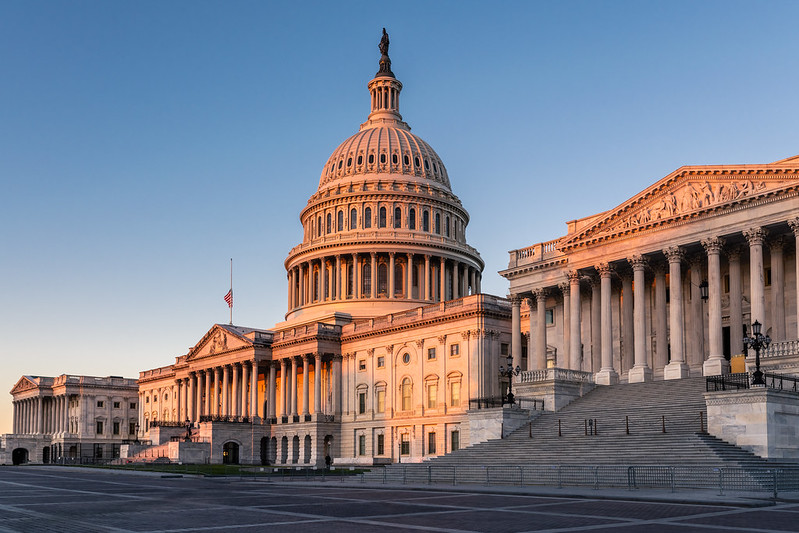
120 Democrat lawmakers in the House and Senate are calling on Congress to pass a $250 billion retroactive tax hike on struggling American businesses in President Joe Biden’s $1.9 trillion Coronavirus package. This would undo the bipartisan net operating loss (NOL) tax cut that has provided liquidity to American businesses that have seen significant losses during the pandemic.
This tax hike contains no exception for President Biden’s pledge not to raise one penny of taxes on any American earning less than $400,000 per year. If Democrats have their way, small business owners below this threshold including restaurant owners and retailers could see a retroactive tax increase.
American businesses, including small and medium sized companies, have seen unprecedented challenges due to the Coronavirus pandemic. Small businesses have been hit particularly hard with forced shutdowns and new government mandates. However, many businesses regardless of size have struggled with a decline in revenues and additional expenses from implementing new technologies for remote work and retrofitting existing workspaces.
Lawmakers should not be clawing back relief for taxpayers after the fact based on the view that these taxpayers are not worthy of assistance.
The bipartisan Coronavirus Aid, Relief, and Economic Security (CARES) Act enacted in March of 2020 allowed corporations to carry back net operating losses incurred in 2018, 2019, and 2020 back five years. It also expanded the ability of businesses organized as passthrough entities to use NOLs to offset against non-business income.
Congressional Democrats are now urging the repeal of this tax cut through passage of two provisions that was included in House Speaker Nancy Pelosi’s partisan HEROES (Health and Economic Recovery Omnibus Emergency Solutions) Act.
First, Democrats want to prevent businesses from carrying back losses before 2018. This would mean 2018 losses could not be carried back at all, 2019 losses could be carried back just one year (to 2018) and 2020 losses could be carried back just two years (2018 and 2019). The CARES Act provision allowing passthroughs to offset business losses against non-business income would also be suspended.
In addition, the Pelosi bill prohibits businesses from taking NOLs if they make “excessive” stock buybacks and dividend payments. This restriction is triggered if the total amount of dividends and repurchased shares since 2018 exceeds 5 percent of the value of the stock in the last day of any taxable year. The average annual dividend yield of a S&P 500 company is around 2 percent so this threshold can easily be triggered by dividend payments alone.
Finally, the bill denies carrybacks if a company triggers section 162(m) or 280(g) of the tax code – provisions that limit the ability of businesses to deduct compensation payments to executives.
Net operating loss carrybacks are not a handout to big businesses or specific industries. This provision is are available to any company and is available to sectors that have been particularly hit hard by COVID-19, such as restaurants, retailers, and airlines.
NOLs are also not a bailout. Businesses are already able to deduct operating losses under the tax code in the year the losses are incurred and can carryforward losses indefinitely to future years.
As a result, net operating loss carrybacks largely change the timing of taxes paid. In fact, the Joint Committee on Taxation finds that a majority of the revenue loss incurred to the government in the first couple of years that this provision is enacted will be offset because companies will eventually deduct fewer losses throughout the 10-year budget window.
There is nothing controversial about expanding net operating loss carrybacks during an economic downturn. Variants of this proposal have been enacted into law repeatedly over the past 20 years on a bipartisan basis and signed into law by Republican and Democrat presidents. For instance:
- The Job Creation and Worker Assistance Act of 2002 allowed five-year carryback of losses for 2001 and 2002.
- In response to Hurricane Katrina, the Gulf Opportunity Zone Act of 2005 allowed five-year carryback NOLs for those affected by the hurricane.
- The American Recovery and Reinvestment Act of 2009 allowed five-year carryback of NOLs for small businesses for 2008.
- The Worker, Homeownership, and Business Assistance Act of 2009 expanded 5 year NOLs to medium and large businesses and allowed them to be used for both 2008 and 2009.
President Obama highlighted NOL expansion as a “fiscally responsible economic kick-start,” in a 2009 press release:
“The Economic Recovery Act included a provision that allowed small businesses to count their losses this year against the taxes they paid in previous years. “Today, the President extended that benefit for an additional year and expanded it to medium and large businesses as well. Business losses incurred in 2008 or 2009 can now be used to recoup taxes paid in the prior five years. This provision is a fiscally responsible economic kick-start, putting $33 billion of tax cuts in the hands of businesses this year when they need it most, while enabling Treasury to recoup the majority of that funding in the coming years as these businesses regain their strength and resume paying taxes.”
Similarly, key Congressional Democrats including House Speaker Nancy Pelosi (D-Calif.) and Ways and Means Chairman Richie Neal (D-Mass.) praised the inclusion of the NOL provision:
- Speaker Pelosi: “The bill also has the net operating loss carryback, which businesses tell us is necessary for them to succeed and to hire new people, and also to mitigate some of the damage that has been done to the economy from past policies.”
- Chairman Neal: “Finally, the bill provides net operating loss relief for many businesses that have been simply hanging on in this country over the last year. It is particularly important to retailers. Based on a bill that I filed with Representative Tiberi which became the basis for this provision, this relief for businesses, big and small, will provide quick capital at a time when it is currently impossible to find.”

